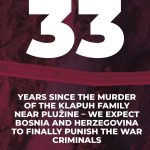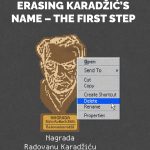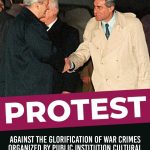
SREBRENICA BETWEEN RESPONSIBLE REMEMBRANCE AND TARGETED DENIAL
06/07/2025
33 YEARS SINCE THE MURDER OF THE KLAPUH FAMILY NEAR PLUŽINE – WE EXPECT BOSNIA AND HERZEGOVINA TO FINALLY PUNISH THE WAR CRIMINALS
06/07/2025TIME FOR A CLEAR DISTANCE FROM WAR CRIMINALS

Non-govermental organizations and civic activists who submitted an initiative to the Public Institution “Ratković Poetry Evenings” to revoke the Risto Ratković poetry award given to Radovan Karadžić express disappointment that this institution has not shown readiness to act promptly on the initiative – despite clearly considering it valid, which we welcome.
Namely, the response from the institution “Ratković Poetry Evenings” states, among other things: “In this case, we are not dealing with a controversial interpretation of historical events, but with a person who has been sentenced to life imprisonment by an international court for genocide and other serious crimes”, adding that this fact “further obliges our institution to clearly state its position and distance itself, leaving no room for relativization or neutrality.”
However, we are concerned that the argument justifying inaction is not based on facts. The award has a decades-long continuity and cannot, legally or substantively, be separated from the manifestation that existed before 1993. Furthermore, this year marks the 55th, not the 13th, edition of the Ratković Poetry Evenings, which confirms the continuity of the award. The official website of the Public Institution “Ratković Poetry Evenings” still lists all previous laureates, including Radovan Karadžić.
The legal continuity is clearly confirmed by two acts issued by the Municipality of Bijelo Polje, available on the municipality’s website, which explicitly state that the Public Institution “Ratković Poetry Evenings” is the legal successor of the previous manifestation.
For example, the Explanation of the Decision on Establishing Public Institution Ratković’s Poetry Evenings, states that it is “necessary to reorganize the manifestation Ratković Poetry Evenings in the spirit of the provisions of the Law on Culture and to establish a public institution that has legal personality and is the legal successor of the existing manifestation of special significance”.
The Founding Study for the establishment of the Public Institution “Ratković Poetry Evenings” further confirms this unambiguously. “In this context, it is necessary for the Municipality of Bijelo Polje to adopt a decision on organizing the Public Institution ‘Ratković Poetry Evenings,’ which would have legal personality and be the legal successor of the existing manifestation”, the document states.
This means that the institution assumes all legal rights and obligations related to the manifestation, including the continuity of awarding prize, and is thus the only relevant entity to decide on the potential revocation of the award.
We also note that Želidrag Nikčević, a jury member who awarded the prize to Karadžić in 1993, a writer and current advisor to the President of the Parliament of Montenegro, Andrija Mandić, was also a jury member for this year’s Thirteenth of July Award, the highest state honour. Sadly, this symbolizes that supporters of war-mongering policies are once again in positions of decision-making and shaping societal values. Therefore, it is essential to show that there is also a Montenegro that does not accept this.
It is utterly inappropriate for the name of a war criminal to be associated with a manifestation that represents one of the symbols of Montenegrin culture, the city of Bijelo Polje, and the name of Risto Ratković. This stain must be removed from the face of the city, its artists, and the state.
We remind that the practice of revoking awards from controversial individuals exists worldwide. For example, German poet and playwright Hans Jost, a close associate of the Nazis, was stripped of all literary awards received during the Nazi regime after the war. There are also 21st-century examples – in 2019, the National Jewish Book Award was revoked from Hesh Kestin due to Islamophobic comments.
We call on the institution “Ratković Poetry Evenings” to reconsider its decision, taking into account the arguments based on the provisions and direction of its founding authority, the Municipality of Bijelo Polje, as well as relevant articles of the founding acts and the Law on Culture.
We hope that this 11 July, the International Day of Remembrance for the Genocide in Srebrenica, will be marked in a Montenegro that takes responsible ownership of its past and refuses to honour those convicted of genocide. This would be an important step for the entire region and a sign that there is resistance to the policies that led to genocide.
Daliborka Uljarević, Centre for Civic Education (CCE)
Tea Gorjanc Prelević, Human Rights Action (HRA)
Ervina Dabižinović, Center for Women’s and Peace Education – ANIMA
Demir Ličina, Association “Štrpci – Against Oblivion”
Velija Murić, Montenegrin Committee of Lawyers for Human Rights
Dina Bajramspahić, civic activist
Jovana Marović, civic activist







 English
English